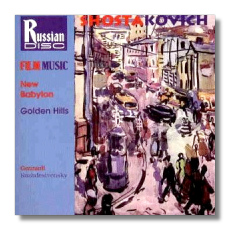
The Internet's Premier Classical Music Source
Related Links
- Shostakovich Reviews
- Latest Reviews
- More Reviews
-
By Composer
-
Collections
DVD & Blu-ray
Books
Concert Reviews
Articles/Interviews
Software
Audio
Search Amazon
Recommended Links
Site News
 CD Review
CD Review
Dmitri Shostakovich

Film Suites
- New Babylon Suite, Op. 18b
- Golden Hills Suite, Op. 30*
Moscow Philharmonic Soloists &
*USSR Ministry of Culture Symphony Orchestra/Gennady Rozhdestvensky
Russian Disc 11064 (Koch) 64min
Shostakovich composed 35 film scores – about twice as many as Erich Wolfgang Korngold – yet this aspect of his work is hardly known in the west. His first film score, for The New Babylon, dates from 1928-9, just four years after his First Symphony. Even at this early stage in his career, Shostakovich had considerable experience with movies. For a time he earned his living by playing piano for the silent films that were shown at a Leningrad theater. Thus when it came time to start work on The New Babylon, he knew precisely what to do. "I was least of all guided by the necessity to illustrate each shot. I mainly proceeded from the principal shot in a set of shots." he later recalled.
The New Babylon is a silent feature set in a posh Parisian department store in 1871 (hence the occasional quotations from Offenbach and 'La Marseillaise'). The plot centers on the tragic love between a salesgirl and a soldier amidst the Prussian invasion of the city. This may sound deadly serious, but – judging from Shostakovich's high-spirited music – there must have also been considerable quantities of slapstick comedy in the Keystone Kops tradition. Yet in the midst of all this light-hearted fun, there are passages that look forward to the darker, more sinister world of Shostakovich's wartime symphonies and concertos. In the words of the composer, "The music maintains a continuous symphonic tone." However the more extended items in this suite, some over fourteen minutes in length, consist of little more than a string of musical vignettes of widely varied mood and texture, presumably reflecting the intercutting of different scenes in the film. Odd juxtapositions of this kind would continue to be an element of Shostakovich's work to the very end, and there is no doubt that his frequent use of this technique stems from his background in the cinema. While the music for this film is occasionally worthwhile, it doesn't hold up well to serious listening outside its intended context. Then again Shostakovich probably never intended it to be performed as a concert work. He said, "The main purpose of the music is to coincide with the motion picture's tempo and rhythm and increase its effect." The score was lost until shortly after the composer's death. Conductor Gennady Rozhdestvensky arranged this suite, and his recording of it – first issued in this country by Columbia in the mid 70s – has all the panache and aplomb that one could want. The sound is boxy and boomy, but even that is an improvement over the original LP.
By the time Golden Hills was produced, talkies had come to the Soviet Union. Perhaps the young composer saw a few of Hollywood's early sound epics before he embarked on this project. Certainly the 'Introduction' has more in common with the lush, overblown film scores of the day than anything Shostakovich was writing at that time. This score lacks the individuality and sardonic wit of the Babylon music. Golden Hills tells the story of Pyotr, a peasant who becomes a worker in the city. It is apparently not a happy experience for him. The ominous organ fugue at the beginning of III makes one wonder if Pyotr has somehow stumbled into a production of The Phantom of the Opera. The most striking portion of this score is the final track, including a macabre funeral march that prefigures the morbid works yet to come from this tormented composer's pen. Rozhdestvensky's interpretation is once again committed and effective. The "Hawaiian Guitar" listed on the jewel box sounds like an intoxicated zither and fortunately plays just a few bars at the beginning of II.
Uneven works, but well worth hearing by anyone wishing to understand the roots of Shostakovich's later and more significant creations.
Copyright © 1998, Tom Godell


















